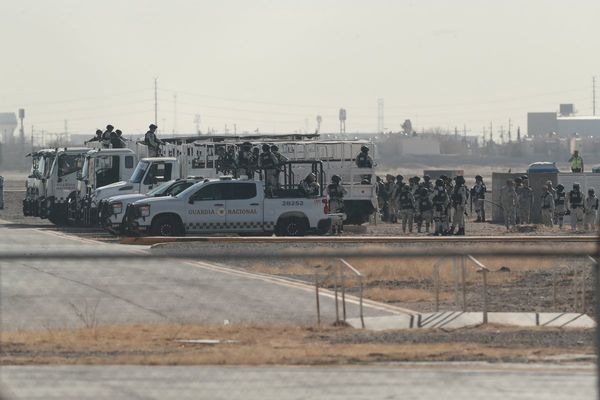
Jo Vallentine writes: Good on Paul Keating for stating some of the bleeding obvious (“Keating’s blast wounds many — and raises inconvenient questions”). Even the amount the government has earmarked for the necessary upgrades to WA’s Stirling naval base near where I live is a scandal at $8 billion — so that we can suffer frequent visits of British and American nuclear submarines until we pay through the nose for the second-hand Virginia-class cast-offs from the United States in the next decade.
Accidents do happen, fortunately not often, but has everyone forgotten the nine nuclear-powered submarines on the floor of the earth’s oceans already? Five are Soviet, four American. Eventually their casings will corrode, spewing radioactivity into the surrounding seas. And the port safety plan for Stirling in the event of an accident is pathetic — tow the boat out beyond Rottnest Island and scuttle it. Hardly reassuring.
But another aspect that hasn’t been mentioned yet is that this deal represents a shocking theft from our children, grandchildren and their grandchildren. Imagine if we put this amount of time, money and brainpower into dealing with the climate crisis. That’s the real threat to our security.
Graeme McLeay writes: AUKUS is a total betrayal of every Australian who voted to get rid of the Morrison government. We now appear to be committed to a defence program dreamed up by Scott Morrison and the hawks at the Office of National Intelligence (ONI), with no dialogue with the Australian people and leaving many China and South-East Asian analysts out in the cold.
Labor’s small-target approach to winning an election has now made it an object of ridicule, doing the Coalition’s bidding. And how do we pay for it? Forget climate change, energy, NDIS, aged care, education and health. With this deal we become a vassal state of the US and, to make matters worse, reliant on a declining United Kingdom, which has minuscule relevance in our region.
Glen Davis writes: Ain’t it wonderful? All the ministers at the robodebt royal commission knew nothing and relied on their public servants. Yet ministers and opposition know all about nuclear submarines.
Michael Bell writes: I attended an Australian Republic Movement meeting recently where Labor MP Matt Thistlethwaite spoke sensibly and constructively about sequencing from Voice to the matter of an Australian head of state — a contrast to becoming a proxy for and indebted to “allies” from a riven state and a failed state.
Paul Keating is right: defend ourselves within our region, not from our region.
Denis O’Brien writes: That’s $46 billion for each sub. And we all know it will increase. Keating was correct: out of the three world leaders, only one had to pay up. It is not as though we are awash in money. The UK is a basket case. We have surrendered our independence.
Sylvia Hobbs writes: I have never been so shocked or frightened by the actions of an Australian government in the 40 years I have lived here. If the US government wants to taunt the Chinese nation, it should have the guts to do it itself — not use Australians as pawns in its sad and desperate attempt to stay the world’s leading nation.
And whose idea was it to keep the subs as close as possible to Australia’s largest cities and populations? Still, they will be closer to New Zealand if we ever want to have fisticuffs with it. I wonder if I could apply to go back there…
And the good news is we won’t have to wait for our own nuclear incident/accident/war. The Japanese are about to release contaminated water from the failed nuclear power plant into the Pacific over the next few months. Coming soon to a place near you.
All good? No.
Bob Pearson writes: We should stop calling the nuclear submarine deal AUKUS, which puts the least powerful first and the most powerful last and obscures the reality of the agreement. We should call it USUKA.
Iain Millar writes: Can I be the first to predict that due to our obligation to dispose of nuclear waste as a favour, we will also take care of our allies’ waste at no cost to them? Our fawning politicians will be fighting each other to agree.
Daniel Magasanik writes: Has Australia been duped into joining AUKUS (“Why has Australia signed up for AUKUS, a deal serving America’s interests, not ours?”)? Certainly not. There was no duping required. Entering into the AUKUS deal, although not very likely to serve Australia’s interests, did serve the Coalition’s and Morrison’s political interests. Having inherited AUKUS, Labor should have ditched it and found another and much cheaper and more immediate way of bolstering our defence capabilities — and actually enhancing our sovereignty. Because it would be extremely difficult politically, I suspect this is the reason no Labor voices, Keating’s aside, have been heard questioning a very questionable deal.
Also note that as matters stand, our “treaty” with the US does not bind it to come to our aid. While a president such as Joe Biden might do so, what about Donald Trump or a Trump-like president? Would that be someone to rely upon?
Mick Webster writes: Australia has had submarines since the Gallipoli campaign, and in 108 years they have never fired a shot in anger (“Paul Keating was right on AUKUS: we have been here before”). Have they ever deterred any “enemy” from doing anything it wants to against us? Seems to me for the billions we are going to spend we could have thousands of smart drones in the air and water protecting us far more cheaply. But I suppose the heavily medalled generals and admirals must have their toys…
Adam Ford writes: Re “The backlash against Keating’s AUKUS spray reveals our incapacity for healthy debate”, the real questions that need to be asked are structural, rather than philosophical.
How is it that there is no editorial voice in the mainstream media that doesn’t see the need to repudiate Keating’s views so aggressively? And what does it mean for our democracy when a handful of people in editorial at News Corp and Nine essentially dictate the national bounds of discussion on such important questions of national security? This question becomes even more critical where we have a two-party political system that seems so responsive to those same voices, and where the ABC seems similarly unable to promote dissenting voices, hobbled under a “false balance” mantra. This is exactly the sort of environment whereby nations become liable to sleepwalk into wars under the influence of powerful vested interests.
The uncritical promotion of what could rightly be termed “ASPI discourse” on anything to do with China is almost universal throughout the mediascape, and it raises questions about how much sway vested interest lobby groups are actually able to hold over our public sphere and therefore our “democracy”. It seems to me that we urgently need to do something about the paucity of media diversity in this country and the now almost pointlessly weak cross-media ownership laws seem like the best place to start.







